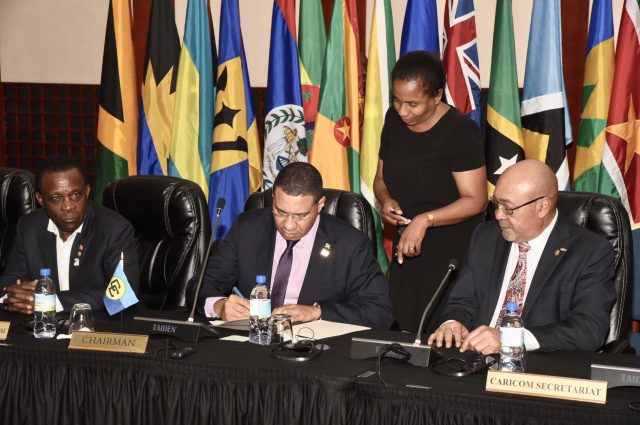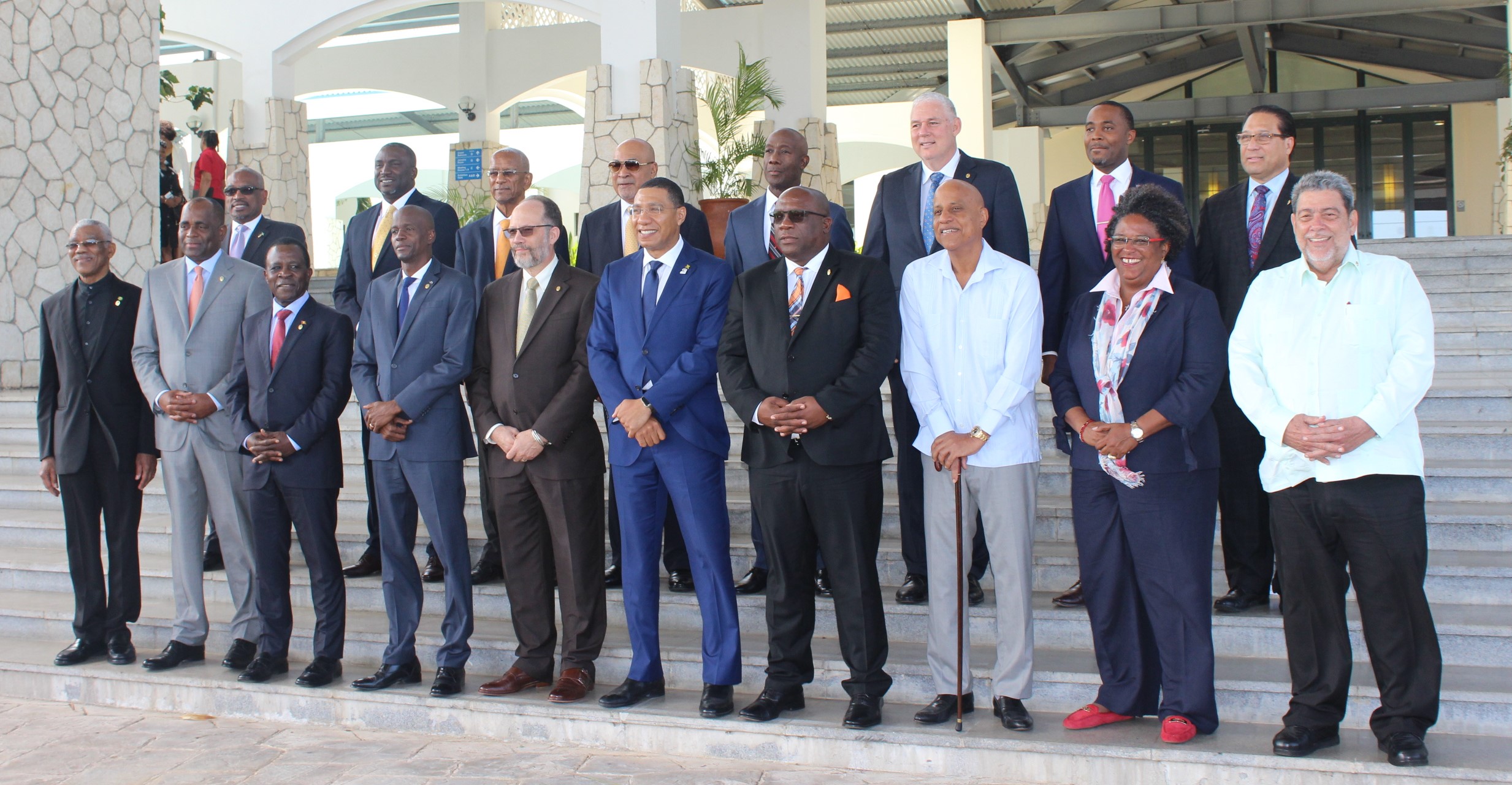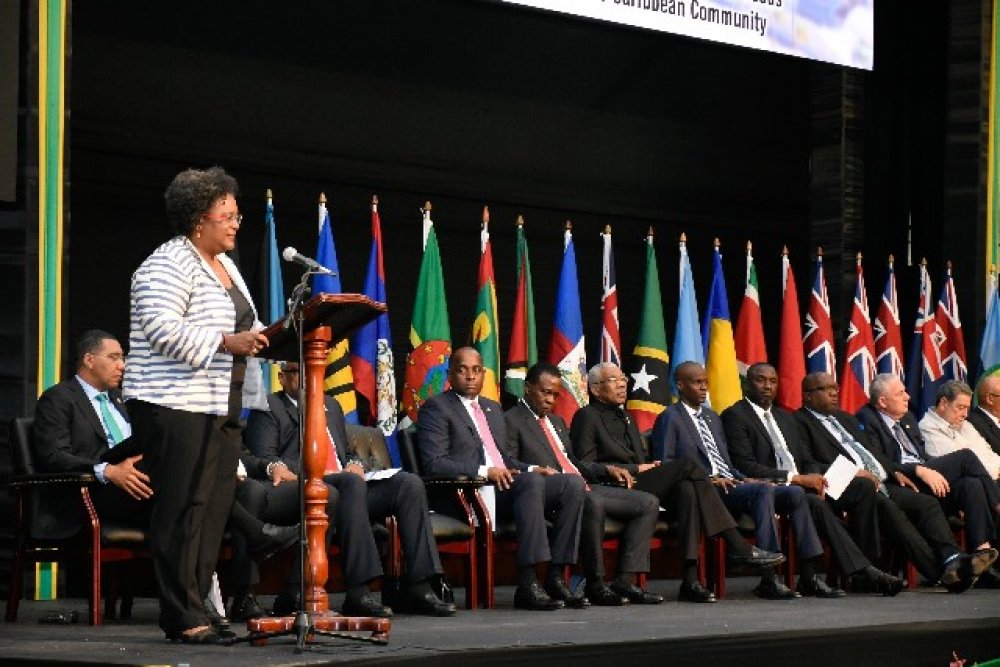The Caribbean Community (CARICOM) CARICOM will pay formal recognition to yet another distinguished daughter of the soil when it confers its prestigious Triennial Award for Women on Ms. Shirley Pryce of Jamaica.
Ms. Shirley Pryce, a veteran advocate for Domestic workers rights, motivational speaker and an “example of women’s empowerment”, joins the rank of some of the Caribbean’s most excellent and exemplary, courageous, committed and creative women. She is the recipient of the Twelfth Triennial Award for Women and, understandably, its conferral is one of the signal highlights of the livestreamed, official opening of the Thirty-Eighth Meeting of the CARICOM Heads of Government, taking place in Grenada from 4-7 July 2017.
Before highlighting the essence of this esteemed award and the narratives of its holders who have blazed a trail fighting for human rights and gender equality, a glimpse of this area of work globally is given to put into context Ms. Pryce’s contribution to change it.
‘Pryce-less’ – Former Jamaican domestic worker is CARICOM Woman of the Year https://t.co/bEVWcvIKWm pic.twitter.com/WY5qH3U1n0
— Jamaica Gleaner (@JamaicaGleaner) July 2, 2017
Domestic Workers across the World: Statistics and Trends
According to a 2013 International Labour Organisation (ILO) Report: Domestic Workers across the world: Global and regional statistics and the extent of legal protection, “domestic work represents a significant share of global wage employment, but remains to a large extent excluded from the scope of labour laws, and hence from the legal protection enjoyed by other workers”. Such exclusion includes paid annual leave, working hours, minimum wage and maternity protection. For instance, more than half of all Domestic workers have no statutory limitation on their weekly working hours and more than two out of five are not given paid annual leave
2010 statistics place the number of Domestic Workers at 53.6 million (2013, ILO). This number excludes the “7.4 million children below the age of 15 years who toil as Domestic workers” and those unaccounted for in labour force surveys 2013, (ILO).
Further, even though a substantial number of men work in the sector, often as gardeners, drivers or butlers, it remains a highly feminized one, consisting of more than 80 per cent women and accounting for 7.5 per cent of women’s waged employment. “In some regions, as many as one in three (Middle East) and one in four (Latin America and the Caribbean) female waged workers are Domestic workers” In this context, the report draws attention to the broader ramification for “greater gender equality in society”, given that Domestic work is an important entry point for women in the labour market, as the statistics indicate.
Labour Legislation
On this issue, only a small minority, one-tenth (5.3 million) of all Domestic workers are covered by general labour laws to the same extent as other workers, while 29.9 per cent (15.7 million) are completely excluded. However, “roughly 70 per cent of all Domestic workers enjoy some protection through a combination of provisions found in general labour laws, specific labour laws, subordinate regulations and state-level legislation”. (2013, ILO)
The Latin America and Caribbean Region has been identified as one where total exclusion from the scope of labour legislation is rare. and as contributing to the encouraging world picture on the issue of legal protection for this sector. (2013, ILO)
Further, according to the report, although the vast majority of countries provide some maximum limit on hours of work, and guarantee minimum weekly rest and annual leave, Domestic workers are often exempted from this standard. However, the Latin America and Caribbean Region is listed as having between half and three-quarters of Domestic workers with the same weekly normal hour limits as other workers.
This brief diversion is intended to provide a backdrop to the ongoing global struggle to achieve Domestic workers’ rights. It is intended also to give context to our own women’s role in bringing change to the Caribbean space and, in so doing lay strong foundations for the principles of equality and justice and the development of the Region. Their advocacy have contributed to the development of model legislation; addressing discrimination through law reform as it relates to domestic violence and other aspects of family law; minimum wage legislation, which removes sex-based occupational distinctions in the determination of wage levels, among other outcomes.
The CARICOM Triennial Award for Women
Improving the status of women has been and continues to be the focus of national and regional development initiatives. Recognition of women’s role in, and impact on, the Region’s development led the Meeting of Ministers of Women’s Affairs, in 1983, to propose an award for an outstanding woman who had made a significant contribution to the socio-economic development of the Caribbean. The CARICOM Secretariat introduced the CARICOM Triennial Award for Women to acknowledge the landmark contributions of inspiring and distinguished Caribbean women.
Ms. Nesta Patrick, a national of Trinidad and Tobago, holds the distinction of receiving the first award, which was conferred in 1984. Since then, eleven awards have been conferred, these are: the late Dame Nita Barrow, national of Barbados, 1987; Dr. Peggy Antrobus, national of Grenada and citizen of St. Vincent and the Grenadines, 1990; Ms. Magda Pollard, national of Guyana, 1993; Dr. Lucille Mair, national of Jamaica, 1996; Professor Joycelin Massiah, national of Guyana and citizen of Barbados, 1999; Professor Rhoda Reddock, national of Trinidad and Tobago, 2002; Justice Desiree Bernard, national of Guyana, 2005; Prof. Barbara Bailey, national of Jamaica, 2008; and Prof. Violet Eudine Barriteau, Ph.D, national of Barbados, 2011 and Ms Marion Bethel, national of The Bahamas (2014).
The narratives of these trailblazers inspire. Their individual stories can be simply described as lifetimes of selfless and dedicated service. Their composite story is of unstinting public service, not only at the international, regional and national levels, but also at the community level. It is a story of integrating women into the mainstream of development; of raising national and international consciousness to a greater appreciation and acceptance of the integral role of women in the process of development. It is also a story of inspiration and mentorship to younger generations of Caribbean feminists; pioneering research work on women in the Caribbean; of positioning the region on global agenda issues through astute leadership; “of charting ways rooted in Caribbean culture, enabling us to make our way with dignity and self esteem”; of innovative work which has informed programming and policy at the national level; of raising the profile of gender and development in academia; and of breaking glass ceilings.
The essence of their narratives is a determination to broaden the parameters of existence for women and girls and to improve their economic, social, political, cultural and legal status; a resolution to tackle the vexed question of underperformance of our Caribbean boys at every level of the education system. Their’s has been the story of gender and development, Caribbean development.
The narrative continues
Ms. Shirley Pryce continues the narrative of excellence . She joins the select army with her tireless commitment and work across sectors, themes, regions and countries in a most selfless manner
She has been a human rights advocate for more than quarter of a century, at both the national and regional levels and for fifteen years at the international level. Her work, which has been described as “ extra-ordinarily crosscutting: Gender and Development, Women and Development, Trade Unionism and Domestic Services”, has shaped policy frameworks at the national, regional and international levels.
As an advocate of the sector, she works in all areas that affect women’s lives and carries out programmes with Domestic workers and their children, particularly with regards to workers’ discrimination and women’s empowerment.
She has been exceptionally influential in shaping the current policy framework on women’s empowerment and gender equality throughout the Region, particularly as it relates to the International Labour Organinsation (ILO Convention) (No189) on Domestic workers.
A Domestic Worker herself for 31 years, she has led the way in changing the situation of Domestic workers nationally, regionally and internationally and today, she is described as “one of the most outstanding Domestic Workers leaders in the world”. In her journey, she established and continues to preside over the first-ever domestic workers union in Jamaica, the Jamaican Household Workers Union (formally titled Jamaican Household Workers Association) that currently represents 58,000 Domestic workers . She is also a Board Member of the Association of Women’s Organisation of Jamaica (AWOJA). A true Caribbean woman, she is also Founder of the Antigua Domestic Workers’ Association as well as Founder and President of the Caribbean Domestic Workers Network.
Internationally, she is an elected Board Member of the Association for Women’s Rights in Development (AWID) and a member of the Caribbean Advisory Group to the United Nations Women and Gender Issues.
In her capacity as President of the Caribbean Domestic Workers Network, she has created awareness of and sensitised policy makers on the ILO Convention (No. 189); advocating for its ratification. In this context, in 2013, Guyana became the ninth country and the first in the Caribbean to do so. This Convention and its accompanying Recommendation (No201), both adopted in 2011, guarantee minimum labour protections to Domestic workers. Being the first international labour standards specifically devoted to Domestic workers, they bring these workers under the umbrella of labour law. (ILO, 2013).
Ms. Pryce’s work and programmes in Jamaica and the wider Caribbean, supported by international Development partners (IDPs) including the ILO, UN Women, the Federick Stiftung (FES), have addressed Domestic workers in the areas of capacity building, advocacy, economic empowerment, labour and gender-based violence.
As well, she has worked along with the Caribbean Policy Development Centre in Barbados in several Caribbean islands to educate Domestic workers on how to access employment and other opportunities through the CARICOM Single Market and Economy.
She was also part of the Jamaica Non-Governmental Organisation team that wrote and presented the alternate report on the Convention on Elimination of all forms of Discrimination against Women (CEDAW) at the United Nations.
Ms. Pryce’s journey has been a long one of political commitment for women’s human and civil rights and for making gender democracy a reality. Along the way this untiring champion, ever committed to the pursuit of excellence and growth, achieved in 2011 a Bachelor’s Degree in Social Work from the Jamaica Theological Seminary; and in 2016 an Advanced Masters’ Degree in Labour Law and Global Workers’ Rights from the , Pennsylvania State University, USA.
She is the recipient of several awards including the Badge of Honour for meritorious service to Jamaica (2006), First Caribbean Bank Unsung Heroes Award ( 2007); the Order of Distinction (Jamaica) for outstanding contribution in working with Domestic workers in the Caribbean (2015); and the Bureau of Women’s Affairs Award for outstanding contribution to initiative focused on sensitizing the public on gender-based violence in Jamaica.
The Caribbean Community celebrates this distinguished daughter and is pleased to formally record her footprints in the annals of Caribbean integration.
References
2013: Domestic workers across the world: Global and regional statistics and the extent of legal protection, International Labour Organisation
Excerpts from the Nomination of Ms Pryce for the Award





